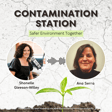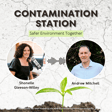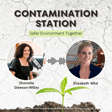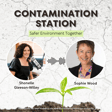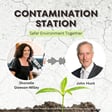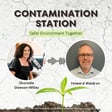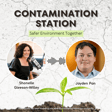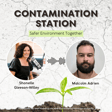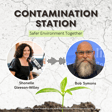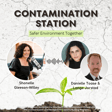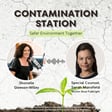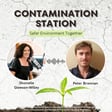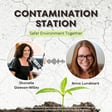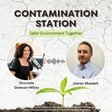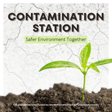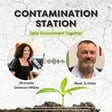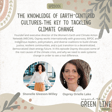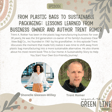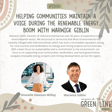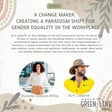Introduction to 'Contamination Station'
00:00:01
Speaker
Welcome to Contamination Station, safe for environment together, a New South Wales EPA funded podcast. In these episodes, you'll hear from those working to implement contaminated land policies and procedures at the local level by sharing our stories, frustrations, wins and losses. Our aim is for this podcast to become a repository of information that will support those currently working to combat contaminated land and for those yet to come.
Meet Joel Little
00:00:30
Speaker
In today's episode, we're joined by Joel Little, former Senior Environmental Officer turned Director and Principal Consultant of Konmara Environmental Management Solutions. The views and opinions expressed in this podcast are solely those of the host and the guest as individuals and do not necessarily reflect those of the New South Wales EPA or any other organisation.
Career Transition to Consultancy
00:00:54
Speaker
Joel started his professional environmental career in wildlife conservation across southeastern Australia, and a move back closer to home saw him take up an offer for an environmental officer role in regional New South Wales with the council.
00:01:07
Speaker
Fast forward over 15 years and Joel has utilised the exposure to the wide range of situations that local government offered to start his own consultancy business, helping residents, businesses and councils in dealing with the complex issues surrounding the environmental assessment, contaminated land, soil and water management and biodiversity space. Thank you so much for your time today, Joel. It is great to have you here. Good day, Cheryl. Lovely to be here.
The Value of Collaboration and Training
00:01:32
Speaker
So Joel, you're closely involved with the CRCB program since its inception in 2015, definitely longer than I've been involved, which meant that you were able to build upon your contaminated land knowledge step by step as the council also increased its capacity to deal with the myriad of complex contaminated land issues.
00:01:52
Speaker
So from what you've shared, it sounds like being able to work closely with your peers and participating in ongoing training and professional development was really key in helping you develop your environmental knowledge to the point that you were then mentoring and training those around you. So given the importance that you've placed on collaboration, do you have any advice that you give to somebody just beginning their career in the environmental industry?
00:02:17
Speaker
Yeah, sure. It's a great question.
Advice for Newcomers in Environmental Protection
00:02:19
Speaker
There's a lot of people working in the environment industry and they're coming from all different backgrounds, experience, generally coming with some sort of degree to get into the industry, but there's so many different environmental degrees out there. And so people are coming in with that wide range of experience. And so I guess I would advise people to just use that experience, use your passion and your skills because
00:02:42
Speaker
We come into the environmental field because we want to look after the environment. We want to see that there's a good outcome, that we want to make a difference, we want to make a change. And so, as you said, I started off working in wildlife conservation and found myself working in an environmental officer role within a local government.
00:02:59
Speaker
And that was predominantly a compliance role, environmental assessment, education, but also compliance. And so that was widely different from what I'd been working on before. But one of the things that I guess my manager told me then is that the reason why I was employed at that stage was because of my customer service experience, my experience with working with people.
00:03:20
Speaker
And so using that environmental experience and using those customer service skills, I was able to grow into that field. And so there's a lot of people working in local government who have been there a very long time. I actually found it quite daunting. Within the first couple of months, I realized there had been people there who started when they were 16 and they were now in their sixties.
Learning from Long-term Colleagues
00:03:39
Speaker
which is quite scary for me at the time, but there's also an amazing source of information and knowledge there. Put yourself in those situations around those people. You can learn so much from those people. You can have really good conversations, and you don't necessarily have to agree with them all the time, but you can learn from them. A lot of people got on-ground knowledge and know the history of things like that.
00:04:05
Speaker
I found that really good. And that's something I'd recommend to everybody is to utilize those experiences and to tap into those resources. Also to try and commit to ongoing upskilling and improvement. Don't just sit in there and be comfortable because the industry changes, the expectations from the community changes. And that's something that I recognize very quickly is that as soon as you improve something, the community expects another improvement on top of that. So you just have to keep improving on
Importance of Continuous Professional Development
00:04:32
Speaker
And in your career, have you done a lot of your own, I guess, professional development and learning or have you relied on your employer at the time to do that or to fund that for you?
00:04:44
Speaker
I was lucky that my direct manager had experience working in water and timber production and things like that. I had a really good chemical knowledge and I had a pretty poor one working here with wildlife. I was able to tap into that, but the council that I worked for was very supportive of continued professional development.
00:05:06
Speaker
I think I did my first UTS contaminated land training within about 12 months of being there. I remember just sitting there with my brain hurting because it was just so much new information that I'd never really been exposed to before. I think the only contaminated land thing I'd done before that was actually clean up an old farm tip, which wasn't really contamination or remediation, just picking up and throwing it in bins.
00:05:30
Speaker
So it was all new and so just keep building on that. And so again, the council was supportive of my passion, which is around environmental improvement. You know, I still love working with wildlife, but seeing that improvement over time. And so just being able to, being access to lots of ongoing training opportunities before, you know, things like the CRCB program came along.
00:05:56
Speaker
And you have mentioned that you started off in wildlife conservation and that is such an interesting field and one which is really, I guess it kind of pulls at your heartstrings a bit as well. It's a feel good position. And there's a lot of us out there who started off our journeys in environmental science, I guess in a similar kind of background, doing the very green degree or wanting to get into the very green space.
00:06:25
Speaker
I ended up in a position that isn't quite so green, more of a brownfield type role or something a bit different. But I'm interested to find out, did you find that going to a local council with your background in wildlife conservation, you did actually find components of your role in council because it is so diverse?
Applying Conservation Experience in Council Work
00:06:45
Speaker
that you went, oh hey, I can actually draw on my experience in wildlife conservation and apply it to this situation. Was there enough crossover for you to go, that's why I did this degree? Yeah, there was some definite crossovers because councils are the lowest rung of government, if you can put it that way.
00:07:05
Speaker
If they've called everybody else, the last person they speak to before they can't deal with anybody is council. And so within the environment section, within the council, you were often the last person they would speak to within the council before nobody could help them again. And so you would often get these very random phone calls.
00:07:21
Speaker
And so working with wildlife, I would get the phone calls about rats or possums in the roof, about pigeons, about possums, all sorts of things like that, which I could utilize quite readily. That was something I could transfer straight into native vegetation. So clearing for development, illegal clearing, that again was sort of in my field. The community education side of things were doing wildlife stuff. I did a lot of guiding.
00:07:46
Speaker
and working with people who had a range of knowledge around conservation, around the natural environment. So being able to interpret and try and present information in lay terms to them was something that I was able to tap into as well. And so it's sort of funny because when I started, I felt, did I feel pressured to impress people? I'm not sure, but it was more about I had this good knowledge. I felt that I had to put that knowledge out there. So when you were doing a report for council or you were doing something for
00:08:14
Speaker
in response to a development i found that i was too technical i provided too much information and you can see you know the black look on people's faces when they started reading this thing and i know i'm doing this the wrong way and i went back to that whole. Guiding my things of tapping into the way that people would understand or would listen and then and then follow that way so i found that my reports overtime in my.
00:08:37
Speaker
responses were probably a quarter of the size that they used to be before, a quarter of the length, because I was able to just really drill it down to the bare bones, just try and keep it simple. And that's something I've continued on with, and that's something I learned probably within the first four or five years that there was a better way of doing this, and I'll hopefully improve on that over time. So that was probably one of the best things I was able to bring to it. So is there anything that you would have done differently if you could start your career over?
00:09:04
Speaker
It's a really interesting question. And I think if you asked me that 10 years ago, I would have given a complete different answer. And I think as we, as we get older, we start to appreciate what life has given us more. And it's something that I'd love to go to just transpose onto my children readily because, you know, they, they have challenges, which aren't big challenges now, but they feel really big. But what I've been able to take is I, I felt that at first that I was going on the wrong path because I was moving further and further away from my passion, which was in my life and things.
00:09:34
Speaker
I was also put into a situation where not everybody thought the same way that I thought or believed or had the same knowledge or understanding or values. And that was a big hit to me because I came from working with wildlife where everybody's passionate about wildlife. When you're working in the field, everybody else's the same passions as you. To having people that really felt like at first that they didn't care.
00:09:58
Speaker
Or they had to really be convinced to care and so that was something that I looking back on that I really knew that was beneficial to me even though that I thought I'd give it a couple of years which a lot of people do in council saying I'll give it two or three years and nearly it was never nearly nothing was one month short of 15 years.
00:10:15
Speaker
Those experiences of working with people were hard to convince, hard to win over, the managers, the people in different sections within council, the engineers, the developers, the solicitors, the real estate agents, all of these different people who were really against what we were talking about.
00:10:33
Speaker
Really, you had the law on your side, but you had to convey that in a way that they understood and then could come around to the best way of doing things. That's something I really value. Even though I've
Reflecting on Career Choices
00:10:45
Speaker
seen the people who continued in the wildlife industry all the way through and I think, wow, they're doing some amazing stuff and that could have been me, I have no regrets from what I've been able to take away. I've met some great people.
00:10:56
Speaker
I've now got a diverse range of experience that I can take that into so many different avenues of my professional career moving forward. And so going back to the very start, you know, if you're starting out in the career and someone says, you look over the next 15 years, I'm going to expose you to every single different component of the environment industry that you can imagine. That was what working local government was like for me. And so, yeah, I can't really say that I do anything differently.
00:11:21
Speaker
Yeah, a great, I guess, introduction to such a broad range of experiences. And whilst I've never worked in local government, what you're talking about is a very similar experience to what I had when I left UNI and ended up after a couple of career changes within the environmental space in construction and exactly the same thing, having to convince people who had higher priorities.
00:11:45
Speaker
much higher priorities and budgets to keep and all the rest of it is, yeah, it's definitely a skill which was well learnt for me as well. Just recently I've come across, unless you use any way, a new degree that you can do through a couple of universities now, I think it is, which is called something like environmental communications and teaching or something along those lines. But basically it's training people to become
00:12:10
Speaker
presenters or disseminating environmental information in an engaging way. I guess the epitome of that is people going on to television shows and being presenters on there for environmental or wildlife type information. When I saw that, I was like, that's what we need. We need that combined with the environmental science degree.
00:12:27
Speaker
And it's often with environmental degrees, communication is often just one small component. I was lucky in my degree that it was actually a pretty sizable component. My original degree that I did first was based around becoming a park ranger, essentially. And so working with the public and interacting with the public communicating was actually a really big component of that.
00:12:49
Speaker
I ended up going off onto a different path, more specialized, but I still look back at those learnings because it's around the communication and to the point where sometimes I thought it wouldn't be bad to go back and do some sort of diploma of education or something like that, to understand how to talk because the younger ones are often the hardest ones to communicate to. And I find it doesn't come naturally to me. I've got teachers everywhere in my family, but I find that really hard. And you're right, it's an important aspect of environment is actually communicating effectively.
00:13:19
Speaker
Hmm, definitely. So what aspects of your background have really helped you specifically in your now what you're doing with consultancy around contaminated land?
00:13:30
Speaker
It's probably that diverse range. I've really got a range of skills that probably a lot of other people don't have working in private consultancy. I know that there's a lot of people who have worked in local government who may have been engineers or town planners or building suppliers, and they go out into that same sort of field.
00:13:50
Speaker
But being an environmental officer, so being a compliance person, an education person, an environmental assessment person, and doing community programs and things like that has brought this broad range of technical skills into my workforce.
00:14:06
Speaker
That's been really good to be able to tap into that. And so very quickly when people, you know, you'd bump into people in the shops and they would say, well, hey, what are you up to nowadays? And they'd explain what they're doing. And the first, you see the guy, oh, I actually need something like that. I need that sort of thing. And no one's asking the same thing. Everyone's asking for different work. But I was finding I could answer most of those.
00:14:30
Speaker
What I found is I focused predominantly on the council type work at the moment and I'm working on both sides of the council now. For instance, I worked on a really tricky DA in a small community and I worked for the property owner who was having a lot of trouble getting this DA across the line and eventually convinced the council that it couldn't be approved and got across the line. And then two weeks later, I was on the other side of the counter helping the council with some tricky contaminated land stuff.
00:14:59
Speaker
So that's pretty interesting. So you have to be very careful about how you manage relationships with people and stuff. But again, I'm coming from both sides there, from that environmental assessment side of things, but also the policy and the technical aspects of the contaminated land program.
00:15:17
Speaker
OK, so what have been some wins that you've had in the contaminated land space, specifically, I guess, around working in the CRCB program, possibly?
Success with Contamination Checks
00:15:27
Speaker
Yeah. Well, the CRCB program, what became before that was an expression of interest through the New South Wales EPA. And I think that was back at a time when the EPA was sort of not quite the EPA again. And so it was the New South Wales government and they were calling out for expressions of interest from councillors who may be interested in a capacity building program.
00:15:46
Speaker
And so I think this is about 2012, 2013. And so we went, yes, definitely we need help. If we thought if someone could come along and train up people with that. So being the first CRCB grant program that we were lucky to be a part of, we were in a group of 19 councils, which was phenomenal. And you had councils that the rate base, they had
00:16:09
Speaker
3,000 ratepayers up to 30,000 or 40,000 ratepayers and so quite a diverse range of councils. And so just getting that implemented and to the point where we had policies and procedures and resources and documents and just some of the basic stuff, so informational councils, websites and that.
00:16:27
Speaker
The really early low hanging fruit sort of information that you want to get going so that contamination is part of that conversation. And I remember that the project officer back then had a whole bunch of planners and building survivors in the room.
00:16:42
Speaker
And he was asking questions about what would you look at at this site? What would you look at this site? And very quickly it came out that everyone was considering contamination as part of their assessments that they do, but had never thought of it front of mind. And so I think, I can't claim that that's been one of my wins, but being part of a program of seeing that now contamination is one of the things that they check, you know, they check, is it bush fire prone? Is it a heritage conservation zone? Is it permissible on the zone?
00:17:12
Speaker
Is there a risk of contamination? And they do that for biodiversity as well. So it's now one of those things they check straight away within council. And that in itself is a big win because it means that contamination is a consideration up front.
00:17:28
Speaker
But then it rolls over. So once you've got the policies and procedures and you've implemented that, which takes a lot of work, you know, I can talk about it in five seconds like that, but it was, it was probably two years worth of work before we'd finally got that, that momentum going where the community was on board, the developers understood that if they were doing this, that you would have to do some sort of assessment because it was a brownfield size. What we were finding that contamination became
00:17:54
Speaker
a point of discussion and negotiation for the sale of the property, for instance, rather than just being, well, whoever's going to buy it is going to deal with it. It's the buyer beware sort of argument that people might have. And it changed to being, well, hang on, this property has been identified through a register or a land use information system or whatever it might be within the council. I want to know more about that. So the prospective purchases
00:18:22
Speaker
We're having discussions about contamination before they even got close to signing on the dotted line. That was one of the wins that we had. It was a property that had never really got occupation certificate staged. There was always weird activities going on. One of those ones where they just keep
00:18:40
Speaker
growing outside the boundary. So you're coming up and there'll be an upside down car on the verge, you know, next to the road and then there'll be a skip bin and there'll be a bunch of pallets and you go out and tell them to move everything off the road. And then you'd look over the fence and like, oh my gosh, what is going on in there? One of those properties came up for sale. And I think the owner thought, I'm just going to flog it off and it's going to be someone else's problem.
00:19:04
Speaker
But the only person interested in what was being for sale as a junkyard was someone who made them go and tidy it up to a cleanup, remove all the waste, do a premium side investigation and a detailed side investigation. And I think once they did the detailed side investigation, they basically negotiated the change in the value of the property based upon how much the remediation was going to cost.
00:19:28
Speaker
And as soon as they purchased the property, it was remediated. They fixed everything that had to be fixed. The occupation certificate was issued and it was done. And that's the win that we're always looking for is encouraging good development. Any property can be remediated because we know that remediation is just fit for purpose. A lot of people coming from the environmental background, it has to be completely clean. But that was a big challenge for me to get my head around that. But it's just suitable for the proposed use.
00:19:58
Speaker
A lot of these industrial sites, you wouldn't want to put a childcare center on them. But we were turning them around from pretty horrible sites. And when you're seeing these reports coming in, they weren't good places. And some of them had childcare centers put on them. They actually turned them around so well, especially in the boom that we've seen in regional areas, that there was a need to push out into these areas that were once dumping grounds and things like that in the 30s, 40s, 50s.
00:20:24
Speaker
And so they were cleaning them up and they were turning them into places that were suitable for residential, suitable for childcare facilities and palliative care facilities and became test cases one after the other of how you can turn around something that was for those instances that were
00:20:40
Speaker
tanneries and timber mills and abattoir and right next to the river that's where they went and it was all perfectly flat ground so that we knew that it was obviously stuff on the ground and we found all sorts of things on the ground but it was all remediated and it's now perfectly safe for the use that's there and that's that's a pretty good outcome.
00:20:59
Speaker
That is a really, really good outcome. Definitely something you should be proud of. So jumping onto something slightly different now, you posted something on LinkedIn, on your LinkedIn profile recently, expressing your concerns about runoff from large scale solar installations.
Environmental Concerns with Solar Installations
00:21:15
Speaker
With the move towards renewables across Australia and in your area, there would be a lot of renewable projects going on with the central orana res, what would you like to see discussed and considered more closely when it comes to potential environmental issues posed by solar and wind developments?
00:21:32
Speaker
Yeah, so one of the things that my role in within Council was to look at erosion sediment control plans and soil water management plans. And that was another thing that was just as challenging as contaminated land, was getting that to be an improved focus of development. And the link that I share was with regards to a solar farm that had been put in probably, it looked like a quite an arid site, I think it was in the US.
00:21:54
Speaker
and solar farm is a lot of hard services. For most jurisdictions, they're classes, permeable infrastructure, because they're not changing the infiltration into the ground. However, it changes the runoff. It changes the way that the water hits the ground.
00:22:10
Speaker
That's an issue for a lot of sites, especially if you're going into something that's highly erodible. You've got sodic soils or acid sulfate soils that you have to consider that you're changing something that with the rainforest was spread out over two square meters, which is roughly the size of a solar panel to then hitting that solar panel running off and then coming off that leading edge onto the ground and so is potential.
00:22:32
Speaker
issue for concentrated flows, erosion, and then going into waterways and where you're getting sediment migration to the waterways. And we know that sediment into waterways results in fish cures and loss of habitat, loss of value in those waterways. It turns a nice, clear, sunny bottom creek or river into a dirty river. However, there's lots of opportunities there as well.
00:22:58
Speaker
Solar and wind, which is predominantly the renewable energy that we're talking about in Australia, is going into areas where industry hadn't gone before, where we hadn't seen big commercial investment before. They're going up on top of hills, which are hard to get to. Because they're on top of a hill, it might be steep slopes, and so you have to be careful of erosion and things like that.
00:23:20
Speaker
Yeah. And so look, that's probably similar to anything that you're building up on top of a hill. So it's just being aware of soil disturbance, how the runoff is dealt with, because these access roads have got to be in place in perpetuity, not concentrating your flows off those sort of sites. And remembering the number one rule for soil and water management is ground cover, maintain ground cover as much as you can the whole way through.
00:23:43
Speaker
But as I said, there's opportunities. So you can put solar farms on grazing properties. You can put them on market gardens, and it actually can provide more diverse sources of cropping. You can put crops in places that maybe were frost intolerant before, especially those ones further out west in Australia where the climate's a bit warmer. You can actually grow things that would prefer a cooler climate because you can grow them in the shade underneath.
00:24:10
Speaker
And we've seen that done quite well overseas where they're growing things like blueberries, which are traditionally found in a forest, in the floor of the forest. They're growing them under a solar farm. And so they can actually use that water that's coming off the solar to irrigate as well in a better way.
00:24:27
Speaker
And solar grazing is another great thing where they just make the panels a little bit higher, ensure that the cables and that are well protected and they're just running sheep under them. And it's no different to grazing in a woodland environment for the sheep's perspective because it's got something where the grass is greener because it's not getting exposed to full sun all the time and there's lots of shade around.
00:24:49
Speaker
And again, coming from that wildlife background is that if your animals are happy, they're more productive, so you're more likely to get higher returns of investment from those animals. So there's issues for any development, but there's also opportunities. And so, considering those issues and opportunities upfront is always what should be done for any development, especially some of those bigger and more complex ones, such as solar farms and renewable farms.
00:25:15
Speaker
I guess, as you stated, there's a lot of opportunities for things like with the grazing underneath solar panels. We're seeing this drought mitigation that is built into having a solar farm with grazing underneath because again, you've got the greener pastures underneath during drought conditions, which prolongs the life of stock being able to be carried on that land as well.
00:25:38
Speaker
Yeah, there's definitely benefits too in conjunction with the benefits being realised through a solar farm or a wind farm. And it's just thinking out slightly outside the box sometimes as to how to actually utilise that.
00:25:53
Speaker
Yeah, yeah, and that's probably a good return back into the CRCB program around, you know, a council regional capacity building program.
Councils' Advocacy in Renewable Projects
00:26:02
Speaker
You know, it's dealing with the councils who are outside the bigger centres, it's dealing with that capacity because they've got, you know, generally a higher turnover and a lower skill base or a more narrow skill base, I should say.
00:26:13
Speaker
And so tapping into that diverse range of skills that are across the board and things like that and considering outside the box, like you said, within those sort of environments in that applications.
00:26:24
Speaker
Yeah, and with these projects we're talking about with the renewables, most of them are state-significant developments. Therefore, the Council's role is limited to assessing the draft Cs or the scoping report and then the EIS providing advice and really pushing for what's best for their communities through maybe a planning agreement or something along those lines. But outside that, unless there's smaller DAs associated with the ancillary facilities or anything like that,
00:26:52
Speaker
I guess it's a real role for councils to really advocate for their own population to get what's best for them, because being state significant, that's not going to happen if the council doesn't do that. Yeah. Councils are a leader of the community in that respect, and it's probably one of the few times where councils don't have that really influential role.
00:27:14
Speaker
on the outcome of the development where they become part of the community, but they can be a collective of the community and you're right. It's probably being more proactive in that respect is that initially and renewable energy is something else that I did within my role at Council and initially the renewable energy side of things was
00:27:32
Speaker
West, well inland, like the bigger investments were sort of double. Double was the break even sort of area because it had a big enough population and good enough solar that the wind farms and the solar farms weren't really coming inland from there. But we've seen with the increased price of energy over time and the dramatic reduction in the cost of panels and wind turbines, you know, it's a 90% reduction.
00:27:58
Speaker
or an increase in productivity of those things, they're pushed further and further inland. And so I think in the last sort of five years, there was three solar farms proposed for around Bathurst, which is near where I'm based. And each one was probably dealt with individually. And so councils do have a role in those areas for a range of things. And it's no different to all the zoning that the master planning that we do for considering how a residential area is going to look over the next 20, 30 years.
00:28:26
Speaker
We should probably be doing that for renewable energy installations and new technology installations as well because we know that there's places where renewable energy is probably not appropriate if it's going to be removing that productivity, for instance, because really, in the end, it's no different to building a shed on the place for 20 or 30 years, so it's lost from productivity. Encouraging renewable energy, such as a solar farm, goes in a way that it could continue to be a mixed-use enterprise.
00:28:54
Speaker
wind farms. We know that aesthetics and amenity and landscapes are really important to communities. So if we've moved into an area because we love the scenery and then all of a sudden there's these huge wind turbines, those turbines are nearly 200 meters tall now. On the top of the mountains that we've grown to love,
00:29:13
Speaker
we might oppose to that straight away and so maybe there's some sort of landscape caveat that we want to have in those areas where we want to push people towards another area which is the impact is going to be less and personally I like wind turbines and solar farms I've seen them in very interesting places and I like seeing them every time because I know that every one of those is less pollution in the air it's better air quality for our kids and for our communities and cheaper energy in the end
00:29:40
Speaker
Yeah, so I think councils have a role in that, in being a little bit more forward thinking into how we can encourage those sort of things to go in the right place. But also on the other technology side of things, we're moving more and more to cloud-based servers and data servers and things like that. And so encouraging the infrastructure to be put into a place that you could have a data server in your community.
00:30:03
Speaker
which ensures that you've got a constant, stable network for your businesses, for your communities, because everything's local rather than going back towards Sydney. People have a perception of the cloud being somewhere, but there's sheds around Parramatta, for instance. There's huge sheds.
00:30:22
Speaker
soaking up lots of energy and so we're sending all of that back to there so there's an opportunity for those and tapping into some of those other emerging technologies around batteries, around electric vehicles and things like that. So councils do have a role to play in being proactive in so many places and most of the time they're very good at doing that because that's what the community wants. It's usually only limited by the resources and the staffing capacity now.
00:30:47
Speaker
Yeah. And I guess they've also got that role to play in working with the other councils that they have borders with because these large installations of renewable energies often cross council boundaries. And therefore, if the councils are able to talk to each other, they can come up with a better solution for everybody all around. Yeah. Rather than operating in isolation. Sure. Well, thank you very much for being my guest today, Joel. It's been an absolute pleasure. It's been my pleasure too. Thanks, Chanel.
00:31:15
Speaker
That wraps up this episode of Contamination Station. Thanks for listening. You've been listening to Contamination Station, Safer Environment Together, an EPA funded podcast hosted by Chanel Gleason Wiley. We hope you've enjoyed our chat and been inspired to continue working towards a safer environment together. We would love for you to stick around for the next episode. So keep those headphones on, grab another cuppa and settle in for more insightful stories.

